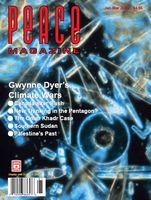
Peace Magazine Jan-Mar 2009, page 31. Some rights reserved.
Search for other articles by PMag staff here
A paper published in November in Geophysical Research Letters showed hard evidence that runaway global feedback on climate change has begun. In 2007, methane levels in the atmosphere, which had previously levelled off, began rising again. The most likely reason is that the Siberian permafrost is melting, as a result of the runaway warming of the Arctic. This wasn't supposed to happen for another 80 years. The great global meltdown appears to have started. It's a gamble from now on.
To help prevent two degrees of global warming, George Monbiot says the UK needs to cut greenhouse gases by roughly 25% from current levels by the end of 2012 -- a quarter in four years. Here are some immediate actions that are necessary but insufficient steps toward this goal:
1. Cap all carbon pollution and sell all emissions permits.
2. Develop a crash program for training builders.
3. Develop a home improvement scheme to insulate and fit homes with good windows at state expense.
4. Stop selling incandescent lightbulbs and inefficient fridges or freezers by April.
5. Increase duty for the most polluting cars eightfold.
6. Close key streets to cars.
7. Increase public subsidy for bus and train travel.
8. Create coach lanes on all motorways.
9. Scrap airport expansion plans. Cap the number of landing slots, to decrease every year until it reaches 5% of current capacity.
10. Stop all opencast coal mining. Impose taxes on extraction of all fossil fuels.
Source: George Monbiot's web site Dec 2: www.monbiot.com
On December 9 a new initiative was launched in Paris, Washington, and Moscow called Global Zero and aiming to eliminate nuclear weapons. "The aim is to get to zero," said Richard Burt, chief strategic weapons negotiator for the United States. He said that even Iran is considered a potential supporter.
Global Zero is proposing deep cuts in the US and Russian nuclear arsenals, a verification and enforcement system, and phased reduction leading to the elimination of all stockpiles. Global Zero has produced a poll showing that 76 percent of people across 21 countries -- including big nuclear weapons states -- favor an international agreement to eliminate all nuclear weapons.
This new initiative occurs just as Barack Obama is about to become US president; he is known to support the goal of nuclear abolition.
Obama wants to see progress on a number of issues, including the "de-alerting" of nuclear weapons (taking them off "hair-trigger alert") and renewing the START arms reduction talks between the US and Russia, which will otherwise expire in December 2009.
Two obstacles to nuclear disarmament are the US's "missile defence system" and its support for NATO expansion into Georgia and Ukraine. Russia considers these actions provocative and threatening to its own security.
For a full list of signatories to the Global Zero statement, see www.globalzero.org/full-list-signatories. You can sign too.
Sources: International Herald Tribune and Campaign for Nuclear Disarmament (CND), UK.
Last year in Bali negotiations began on an agreement to succeed the Kyoto Protocol. In December the second meeting in that series took place in Poznán, Poland, and next year there will be a final meeting in Copenhagen.
The main objective is to cut global emissions of greenhouse gases and thereby limit climate change. All countries will have to meet this challenge, but not all countries are equally vulnerable to the effects of climate change. Even some of the rich areas will be harmed, such as New Orleans and Florida, but several poor countries are especially vulnerable, for they lack sufficient financial wherewithal to cope.
An Adaptation Fund has been created to finance projects in such vulnerable developing countries as Bangladesh and Tuvalu. However, the start-up for this fund has been delayed by legal questions about the principle that developing countries should have direct access to the funding. There are concerns about the oversight of how the funds are spent. In Poznán a solution was reached.
The fund is financed by a 2% levy on the sale of emissions credits by emission-saving projects in developing countries under the Protocol: Clean Development Mechanism (CDM). This is a plan whereby affluent countries that cannot meet their own emission-reduction targets can offset their failings by funding projects in developing countries.
Another goal is to reduce emissions from deforestation. The loss of forests in the tropics is responsible for almost 20% of global greenhouse gas emissions. This must be addressed in the Copenhagen agreement. In Poznán, methodological agreement was reached that will lead to progress on this issue in 2009.

Peace Magazine Jan-Mar 2009, page 31. Some rights reserved.
Search for other articles by PMag staff here